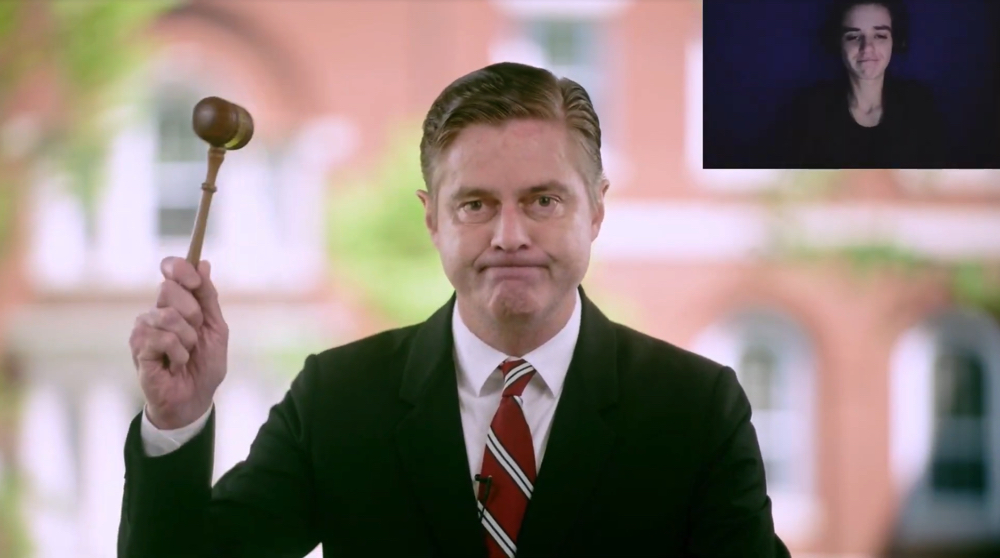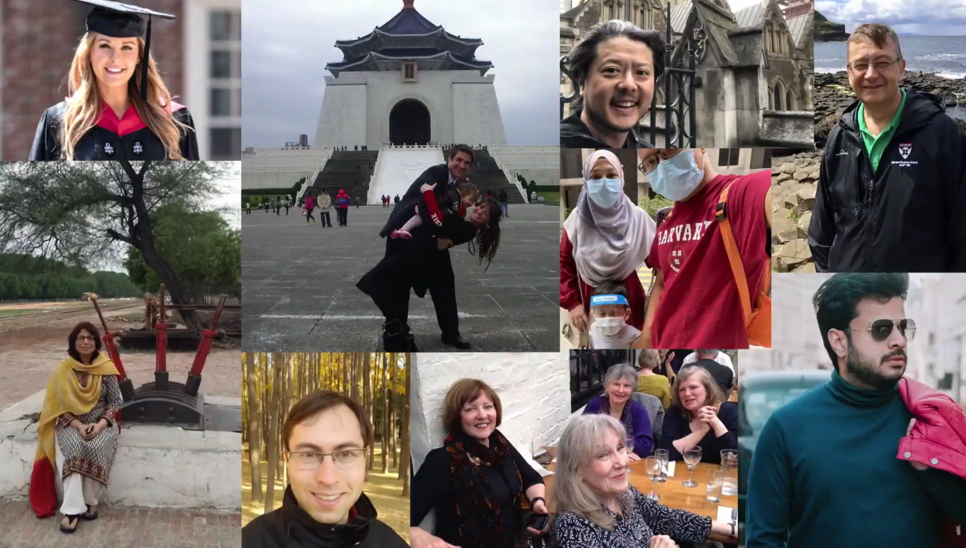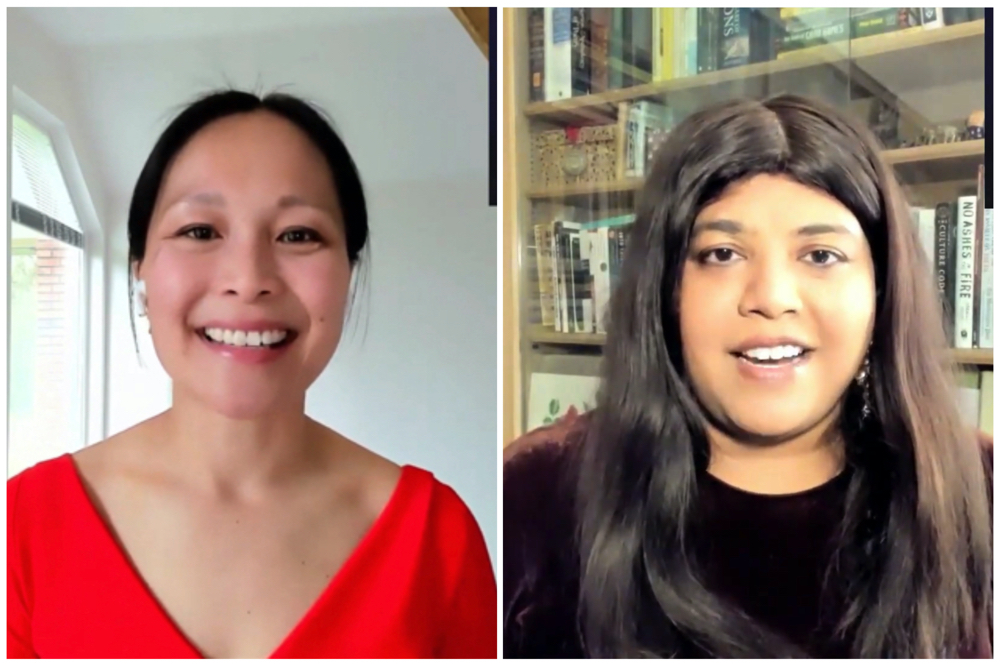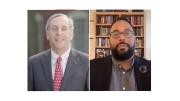Following the second pandemic-induced virtual graduation exercises, on May 27, the Harvard Alumni Association (HAA) conducted its annual meeting this year, also virtually, on June 4, in keeping with its plan announced late last year. The event anchored online reunions and created an “afternoon” counterpart to the “morning exercises” (conferral of regular and honorary degrees) program that together usually make up Harvard’s gala Commencement day. During the crisis in the spring of 2020, there was barely time to create the graduation program, and none to accommodate reunion and HAA events.
At today’s program, HAA president John West, M.B.A. ’95, served as host; he reflected on the year that was, in part, by citing his favorite song, “Love Is Bigger Than Anything in ITS Way,” by U2—a fitting message about collective resilience in the face of loss and challenge. HAA executive director Philip Lovejoy lauded the alumni for their work on behalf of Harvard and one another—including connecting to hold “dance parties on Zoom!” The chief marshal of the twenty-fifth College reunion class, lawyer and civil-rights activist Anurima Bhargava ’96, who would ordinarily have addressed a luncheon spread between the morning and afternoon exercises on Commencement day, observed that this disrupted year “provided an x-ray of where the bones of our societies and nations are broken, where the tissues that bind and connect us have worn away, and where the wounds deepen and linger”—and also, “a year where we understood the value and blessings of community.”

HAA president John J. West hosted the association’s first virtual annual meeting.
Screeenshot by Harvard Magazine.
There were two principal speakers. President Lawrence S. Bacow, who would ordinarily report to the alumni in an afternoon address, first presented the 2020 and 2021 Harvard Medalists, recognized for service to the University. Reflecting on the work of the University and its extended community during crises like the one now waning, Bacow said, “Harvard is our best effort at our worst moment.” Poet Kevin Young ’92, now Mellon director of the Smithsonian’s National Museum of African American History and Culture, spoke to the times from his experience before and at Harvard (“There was rather a whiplash effect being in Cambridge”) and through his recited poetry (“Blackness was both a given, and something sought. It was a home and a departure”).
A detailed account follows.
“No Matter Where We Stand, We Share the Same Soil”: Chief Marshal Anurima Bhargava ’96

A montage depicted alumni throughout the world.
Screenshot by Harvard Magazine.
A colorful “pre-show,” complete with a virtual alumni parade, preceded the annual alumni association meeting. Backed by jaunty music and hosted by alumni commentators Nancy J. Sinsabaugh ’76, M.B.A. ’78, and William R. “Bill” Horton ’77, K ’12—one of them top-hatted, as is the tradition for members of the HAA’s “Happy [Observance of Commencement] Committee”—the parade featured a slideshow that took viewers on a trip through Harvard Yard and down memory lane.
In the first of the speeches that followed, HAA president John J. West, M.B.A. ’95, marveled at the “potential collective power” of the University’s 400,000 alumni. “Not power in a self-serving or controlling sense—quite the opposite,” he stressed. “Power to create positive impact—to do good, to drive change in the world.” In keeping with the theme of doing good, HAA executive director Philip W. Lovejoy used some of his time to commend alumni for promoting discourse on climate change and antiracism.
Incoming HAA president Vanessa W. Liu ’96, J.D. ’03, picked up on the thread of alumni antiracism work, highlighting the community’s commitment to solidarity and allyship. “As videos of elderly Asians being attacked surfaced, followed by the Atlanta shootings of Asian women, I shared on social media some of the painful personal experiences I had growing up Chinese American,” she recalled. “The next thing I knew, I got emails from the Harvard Clubs of Ireland and Boston, asking if they could host an allyship event to show support for the AAPI [Asian American and Pacific Islander] community.”
Chief marshal Anurima Bhargava ’96 then took the virtual stage to describe the alumni community as “an anchor and a port.” At Harvard, she said, we “sustain one another in these times where the ground keeps shifting, and know that no matter where we stand, we share the same soil.”

Pictured (from left): Vanessa W. Liu, Anurima Bhargava.
President Lawrence S. Bacow proceeded to present Harvard Medals to the three 2020 honorees, who were deprived of a ceremony last year, and the three 2021 recipients.
Following his presentation of the six medals, Bacow conferred another distinction albeit a “dubious” one—upon the entire audience. “I congratulate all of you,” he said, “on being the first alumni to attend an annual meeting of the Harvard Alumni Association online.”
Their real distinction, Bacow went on to say, was stepping up to support the University during the COVID-19 crisis. He thanked alumni for opening their homes to displaced students at the College, securing “literally tons” of PPE for Harvard’s teaching hospitals, and propping up the institution when it faced “one of the most severe financial challenges since the Great Depression.” “You were there with record-breaking support—the most current-use gifts we’ve ever received in a single year,” he told them.
The University’s alumni didn’t just step up for Harvard, Bacow added. They also worked to mitigate the effects of the pandemic on the country and the world at large, “speed[ing] progress toward freedoms that so many of us once took for granted.” The Johnson & Johnson and Moderna vaccines both had “origins in Harvard labs,” Bacow noted—and the Massachusetts Consortium on Pathogen Readiness, a Harvard-based initiative, has had “an outsized role” in the battle against the virus.
Bacow recognized that the work of alumni for a better world will not end with the eradication of COVID-19. “When we meet next year, the pandemic will, I hope—with lots of hard work and a bit of luck—be behind us. But climate change will still be with us; inequality will still be with us; injustice will still be with us,” he said. “Godspeed!” he added, as his parting word to the audience.
Hearing “The Music of History”: Kevin Young at the 151st HAA meeting
Three years and one global pandemic ago, poet Kevin Young ’92 came to Harvard to help launch Commencement as an alumni speaker at the Phi Beta Kappa Literary Exercises in Sanders Theatre. Newly named as The New Yorker’s poetry editor, he was then still growing into a role as director of the Schomburg Center for Research in Black Culture at the New York Public Library. Now, growing into a new role at the Smithsonian, he returned to Harvard again, in virtual form, as the featured speaker in an extended Commencement week’s closing act.
Noting his newest job, directing the Smithsonian’s National Museum of African American History and Culture, Young called himself “a kind of accidental, or should I say lyrical, historian.” And in an expansive, evocative, at times intimate talk, he offered up pieces of history: of music and song and poetry, of blackness in America, and of his own artistic development—both in his parents’ home of Louisiana, where he became a poet, and at Harvard, where he learned to call himself one and to hone his craft. “Those rainy front porches,” he said of Louisiana, “are where I came to understand that poetry was not the ethereal or the effervescent, but the mud and red dirt, the homemade elegance.” The poems in his Harvard senior thesis ended up becoming his first book, Most Way Home, published in 1995.
Young spoke of the Harvard teachers and professors who helped shape him and his writing: poets Lucie Brock-Broido and Seamus Heaney, Litt.D. ’98, civil-rights activist Julian Bond, historian Nathan Huggins, and novelist Carolivia Herron, “who taught me to teach and also how to be.” He talked of finding “literary ancestors” like the African American poets Langston Hughes and Gwendolyn Brooks, for whom “Blackness was both a given, and something sought. It was a home and a departure.” At Harvard, Young read novelist Toni Morrison, Litt.D. ’89, for the first time. He joined the Dark Room Collective, a Cambridge-based community of black writers, and revived the black culture and art magazine Diaspora. He recalled working as a DJ of “alternative R&B” at WHRB, where “I had permission to be brown and black and anything I wanted,” and where he found a voice in the music that helped him see “what poetry could be.” He recalled the friendships and deep connections he made with black classmates on campus, including Colson Whitehead ’91. “I say all this to say that in my experience, if community is not around, it must be found—or founded,” he said. “African American studies was long from its current revival, so we were our own ad hoc black studies program….We knew that blackness was everywhere and, as they say, everything—which is not to say it was the only thing, but it was in our music, our dancing, our talk, our luck.”
The experience of blackness—its richness and joy, sorrows and injustices—was the thread woven throughout Young’s talk, in which he recited poems from Most Way Home, his 2011 book Ardency, a chronicle of the rebels from the slave ship Amistad, and a series of sonnets from Brown, set partly at Harvard and concerning “the history of music and black life there.”:
We were black then, about to be
African American, so folks schoolhouse rocked
& smurfed whenever we damn well pleased.
We should have done more, or believed
Of his college days in Cambridge and Boston, Young recalled:
Not that campus was always welcoming. Going to college in Boston was alienating and strange at times and then there were the racist things folks would yell at you from passing cars. Once a month or so, I had to escape to Mattapan, taking the Red Line to the end to see my Aunt Lydia and Uncle Alvin, to get some good food and talk. I had become an English major by default, too, almost, as African American studies, one of the first black studies departments in the nation, had only one faculty member left. I had to find my way on my own, becoming an autodidact self-taught, though I was in school, with my junior paper later becoming the kernel of The Grey Album, my book about the blackness of blackness.
Later, citing a recent Crimson article that revealed a twentieth-century Ku Klux Klan presence on campus and a cross-burning that took place outside a black student’s dorm room during the 1950s, Young wondered:
What would I have thought then had I known that the Klan had burned a cross in the Yard only 30 years before my time? Now, nearly 30 years after that, we still must say how recent that was, and ask how different was a cross from the racism of fellow white students who said aloud as African American studies began to rebuild, we simply couldn't lower our standards. Was the Klan part of the standards? Would I have been more upset, knowing that it had happened, or knowing that it hadn’t been acknowledged?
Tying those questions to the nation’s current “tumultuous time,” Young argued, “We are in need of a history reclaimed and fully explored, and of a lyrical leadership that, like a good poem does, makes unexpected connections, grows audiences, and allows meaning to emerge, and also to soar.” A career spent in archives has taught him, he said, “that not only are we living history and are living history, but that history speaks to the here and now, that we must listen to it and listen for it….The archive is alive, the museum and the university is made up of moments and memories but also of silences that now speak.” Until recently, he added, the 1921 Tulsa massacre, now the subject of museum exhibits and public discussion, was one such silence. “The model of black history isn’t simply recording, but testifying, in the legal and the religious sense of being called and calling out. Of witnessing, which isn’t just seeing, but also saying.” Black poetry has always witnessed in this way, Young observed, by describing the world and the black perspectives within it, in poems that convey a “deeper story, a further music.”
Winding toward his conclusion, he returned to the museum he now directs, where that further music “governs the sphere of influence, a metaphor for black culture that courses through our airwaves and Internets, for that African American story at the heart of the American experience, for the black people who have shaped the nation and made it a more perfect union. I’m interested, as always, in the history of music and the music of history. What we can hope for is hope.”









